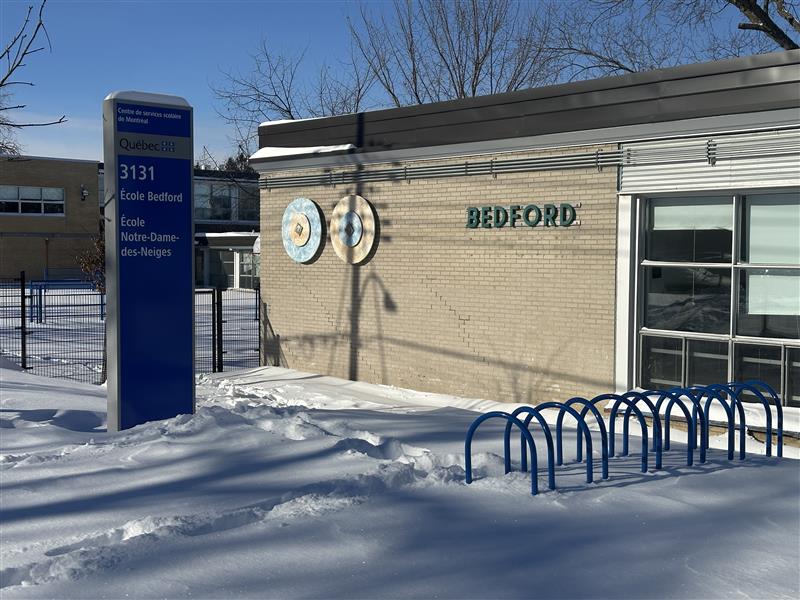Action plan suggests Quebec teachers be evaluated every two years, after Bedford School report

Posted February 14, 2025 10:26 am.
Last Updated February 14, 2025 5:25 pm.
Teachers in Quebec schools should be evaluated every two years by the management of their establishment, with the support of independent experts if necessary.
This is the opinion of the two independent supervisors who were called upon to produce an action plan aimed at avoiding situations like those that occurred at the Bedford School in Montreal.
A devastating report released last year documented a toxic climate imposed by a clique of teachers at Bedford School. The clique, which the report described as being “predominantly composed of teachers of North African origin,” created a climate of intimidation both toward students and other teachers who opposed their ways, according to the document.
“We are very happy to see the recommendations that were made because it cements what we have already been doing for a few months,” said Isabelle Gélinas, the director general of the CSSDM, which oversees Bedford. “We are on the right track at Bedford. It will also make it possible to generalize certain actions to all of our schools.”

Gélinas said the climate and the competence of teachers are among the actions they want implemented — and that many are already in progress.
“In relation to the support to be provided to school management, to the need for teacher training in this school, because there are still almost half of the teachers who are new staff members,” she said. “There was also training offered to all the staff of the school team, we also work with the daycare service. And the parents too — a lot of communication with the parents to re-establish the climate of trust, because our priority was that these children were well.”
11 teachers were suspended at Bedford after allegedly committing physical and psychological violence toward students and staff.
The province then launched investigations in 17 schools to ensure respect for secularism, following complaints from Quebecers.
“These are independent investigation committees,” said Gélinas. “So when we see the results, we will address the more important questions.”
While they made recommendations that apply specifically to Bedford School, the observers also put forward some ideas that could apply to all schools.
The 12-page plan outlines 24 recommendations for Bedford – including supporting teachers in the adoption of classroom management practices.
According to Jean-Pierre Aubin and Malika Habelm, requiring school management to evaluate their teachers every two years would allow them to validate their skills.
Thus, school management would be accountable for the quality of teaching offered in their establishment, while teachers would be required to keep their skills up to date.

The supervisors believe that the obligation for management to carry out such formative assessments should be included in the Education Act or its implementing regulations.
They call this recommendation a medium-term objective, meaning that it should be implemented by Sept. 30, 2026, in their opinion.
“What concerns us is the fact that we have generalized measures that must be taken at Bedford, where there was a problem, and e are now trying to apply these solutions to all of Quebec,” said Richard Bergevin, president of the Fédération des syndicats de l’enseignement (FSE-CSQ) union, which represents more than 95,000 teachers from school service centres and school boards across the province.
“That concerns us because not all communities experience the same problems across Quebec,” Bergevin said.
“The Education Act already provides the necessary tools to school principals to be able to carry out pedagogical supervision, the professional aspect of teachers and teachers, and also personnel management, therefore the aspects of labour relations, collective agreement, etc.,” Bergevin added. “So school principals have all the necessary tools to do their job. Often, what is lacking is resources, human resources, or material resources or financial resources to be able to do their job well, to be able to ensure that the school is functioning well.”
Bergevin mentioned that measures should be taken to avoid a repeat of Bedford.
“We want to have teachers who are focused on their teaching, who are focused on students and making them succeed, and we can’t stand the problems that were experienced in Bedford,” he said. “We must focus on giving teachers in Quebec the means to be able to provide quality educational services.”
The Minister of Education, Bernard Drainville, reacted to the entire action plan by recognizing that the two supervisors had carried out “rigorous” work.
“I have already committed to legislating to strengthen secularism in our schools. Their observations will guide our work and, I repeat, nothing is excluded. The priority is the well-being of our students and we will evaluate all options to achieve this,” he said in a press release.
Gélinas reassured parents and the community at Bedford.
“It is an environment that is very well supported and we see that the students are well, are smiling, are happy and above all benefit from quality teaching because they are supported by a whole team,” she said.
Collective agreements and professional order
In their 12-page document, made public on Friday, Aubin and Habelm argue that “the rigidity and heaviness” that accompany the application of collective agreements “contribute, in certain cases, to prioritizing the working conditions and professional autonomy of the teacher to the detriment of other considerations.”
They stress that their aim is not to undermine the professional autonomy of teachers, but say that their accountability must also be ensured.
Among their other recommendations, we find the possibility of integrating into the law the obligation to speak French “in all areas of the school likely to be frequented by students.”
The Bedford Elementary School investigation report noted that it was common to hear some staff members speaking in a language other than French in places such as the staff room, corridors, classrooms and the principal’s office.
The supporters also suggest adding an article to the law prohibiting any religious demonstration or activity in schools, whether during or after school hours, and reconsidering the advantages and disadvantages of creating a professional order of teachers.
Measures in place in Bedford
Regarding the specific case of the Bedford school, the two supervisors mention that the Montreal School Services Centre has “already initiated numerous projects that should have positive repercussions on direct service to students.”
They note, however, that certain considerations, such as the size of the organization, its precarious financial situation and its organizational culture, mean that it could take some time before the expected results are achieved.
Aubin and Habelm propose, among other things, to support teachers in teaching the science program and in adopting classroom management practices.
Supporting management in its management role and promoting the integration of new staff members are also part of their recommendations specifically targeting the Bedford school.
Following the report on the Bedford school, eleven teachers had their certificates suspended. Drainville also announced that 17 other schools would be subject to audits regarding compliance with secularism.
Drainville also received the report concerning these checks. Without revealing its content, the minister said he was not reassured on Thursday.
“I am as worried as I was,” he said in a press scrum at the National Assembly.
The report is still under analysis. It should be made public in a few weeks.








